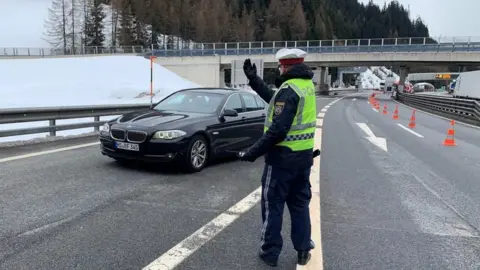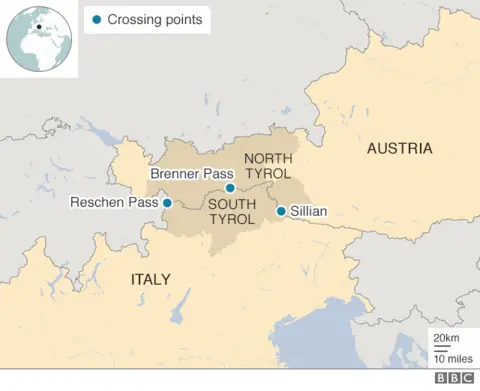Coronavirus: Italians barred from Austria to stop spread
 EPA
EPAAustria has banned people entering the country from Italy unless they carry a medical certificate, in an attempt to stop coronavirus spreading.
Speaking after the Italian government imposed travel restrictions across the country, Chancellor Sebastian Kurz said Austrians returning from Italy would have to self-isolate for two weeks.
Austria has seen 158 cases of coronavirus so far.
By contrast, Italy has had more than 10,000 cases and 631 deaths.
The number of cases in Italy continues to rise and 168 more fatalities over the previous 24 hours were announced on Tuesday evening. Health officials said 8,514 people were currently infected, a rise of 529, while a further 1,004 had now recovered.
Mr Kurz said the number of cases in Austria was still very low, but the disease was deadly.
Austria and Italy share a border north of Italy's South Tyrol region. On Tuesday, South Tyrol, in common with the rest of Italy, closed all cultural centres and restricted access to bars and cafes to daytime hours.
Italy's nationwide lockdown limits travel to those with "verifiable work requirements or situations of necessity". All sporting events have been suspended, and schools and universities have been shut until 3 April. Employees have been urged either to work from home or take annual leave.


Hotel and tourist accommodation operators in South Tyrol have ended their winter holiday season early and agreed to delay the spring tourist season.
In other developments:
- Italian mortgage payments will be suspended to cushion the economic blow of the epidemic
- Spain has reported 1,622 cases, almost half in the Madrid area, and all Spanish sport is to be played behind closed doors until April, including La Liga matches
- Several German states are imposing restrictions. Bavaria will ban events involving more than 1,000 people
- Denmark has recommended avoiding public transport during the rush hour and banned flights from northern Italy, part of Austria, Iran and areas of South Korea and China
- Czech schools will shut from Wednesday and authorities are looking for dozens of customers of a Czech Uber driver who tested positive for the virus
What do the Austrian measures mean?
As well as barring Italians from entering the country, "regarding Austrians in Italy, we are currently organising a repatriation of these Austrians", Mr Kurz told reporters in Vienna.
Five mobile teams began health checks on the Brenner Pass as well as two other routes between the two countries on Tuesday.


Austria is introducing further restrictions. University teaching is being suspended, as well as indoor events involving more than 100 people and outdoor events with more than 500.
"The fewer social contacts there are, the better prepared the hospitals will be," said Mr Kurz. The health minister said Austrians had to change their lives for the next few months.
How is the lockdown working in Italy?
Many of Italy's cities were described as quiet on Tuesday. Bars and restaurants in Rome were open but there were few tourists around.
Prime Minister Giuseppe Conte has urged Italians to stay at home, and the effect on the nation's cultural life has been immediate.
Gyms, cinemas, swimming pools and schools have closed, and the Serie A football championship has ground to a halt, but public transport is still operating.
In a decision that appeared to go against the grain of the Italian measures, Pope Francis urged Catholic priests to visit people infected by the virus.
"May they accompany healthcare professionals, volunteers in the work they are doing," he said during a Mass for visiting clergy at the Vatican.
The virus is most deadly for Italy's elderly, according to figures from coronavirus emergency commissioner Angelo Borelli, who said the latest fatalities involved people already suffering from other illnesses.
Seventy-seven were aged 70-89, while just 10% were aged 50-69. The remainder were over 90.


